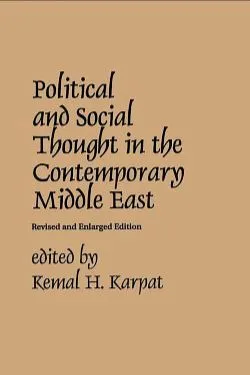
This is a really good collection of primary sources on Middle Eastern political and social thought, c. 1981. The stated purpose is to identify the thought that the editor–Kemal Karpat–thinks will guide the future of the Middle East.
Found in this book are perspectives from the Arab world (which make up the largest portion of the book), Israel (really, Zionist thought), Turkey, and Iran. I’m not sure that the works on Israel belong here, and they’re disproportionate to the size of the country. This is especially apparent given the small section on Palestine in the Arab thought segment.
For the most part, the perspectives in all countries listed can be divided into three major categories: nationalist, modernizing-Marxist, and fundamentalist. Arab nationalism, shuʿbiyya, Turkish nationalism, Turanism, and Zionism all fit best in the nationalist section. On modernizing-Marxist, there is an enormous range of texts: Baʿthism plays a part, as does Kemalism. Leftist texts mostly fit here. Then, on fundamentalism, we see figures like Hassan al-Banna for the Arab world, Kahane for Israel, and Ruhollah Khomeini and MEK in Iran.
The major absence, given the recent history of the Middle East, is neoliberalism. I’m not sure that I can fault Karpat for this. Many Middle Eastern/North African states pursued neoliberal policies in the 1980s–after the book was published–in response to mounting debt crises. In Tunisia, for example, these rising expenses forced founding president Habib Bourguiba to turn to the IMF, which in turn forced the country to follow a structural adjustment program. The liberalization that took place was nowhere near what the IMF had hoped, as the cutting of bread subsidies led to riots across the country, and Bourguiba was forced to withdraw such punitive reforms. However, it remained true that most Middle Eastern countries–including Turkey and Israel (following the successes of Likud in the 1980s)–liberalized their economies. This liberalization, in turn, entrenched the establishment and inevitably led to deepening corruption.
The turn to neoliberalism in the Middle East was not something thought out and prepared for by Middle Eastern intellectuals or political leaders. It was instead a reactive policy designed to respond to urgent circumstances. However, it has been a very important turn, and neoliberal policies and thought remain important across the Middle East.
Still, this is a great book for getting a sense of what seemed to be the most important intellectual trends in the Middle East c. 1980.